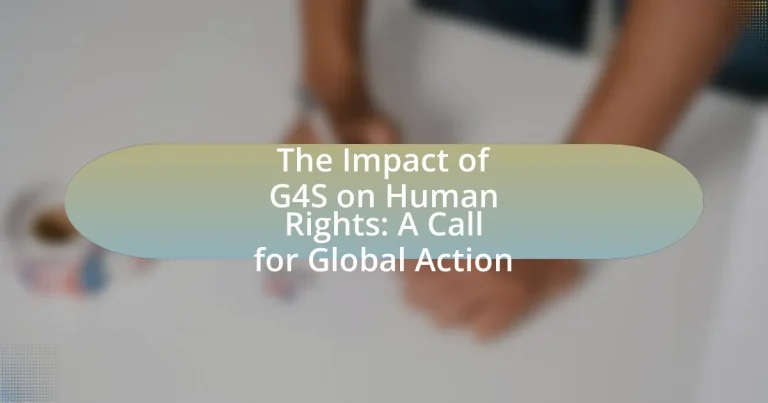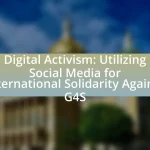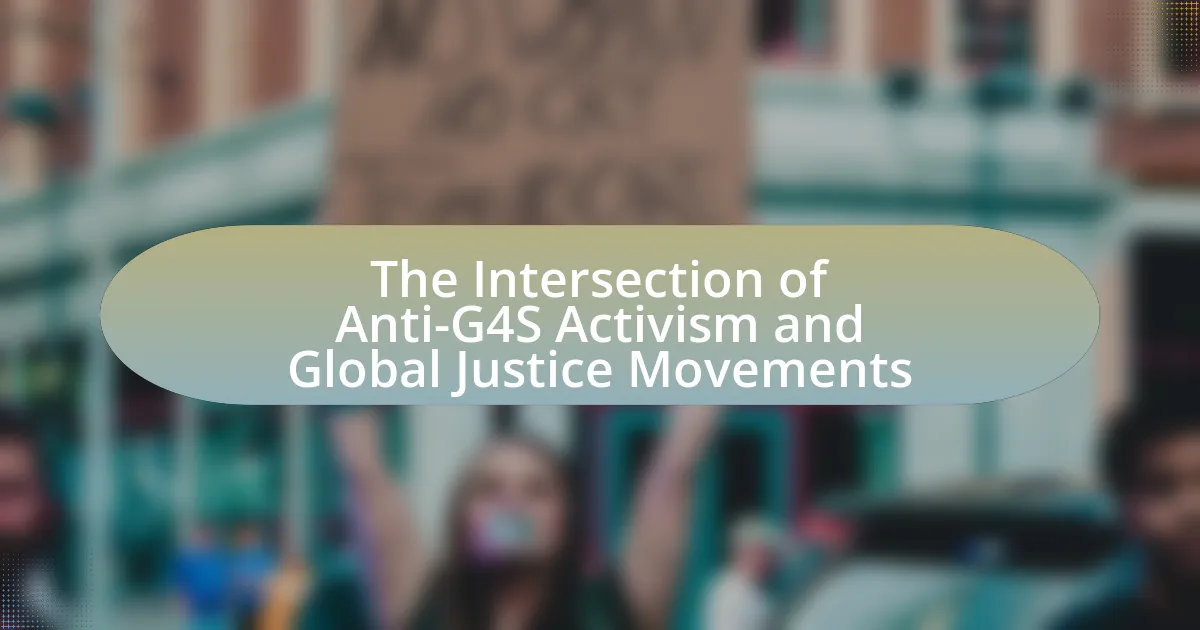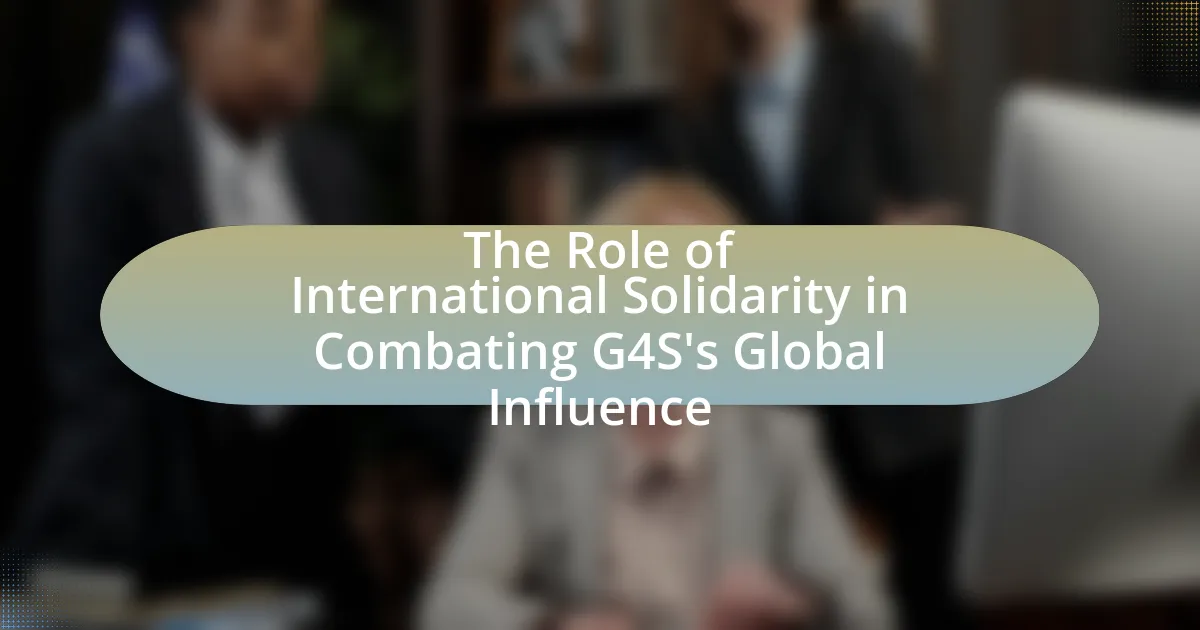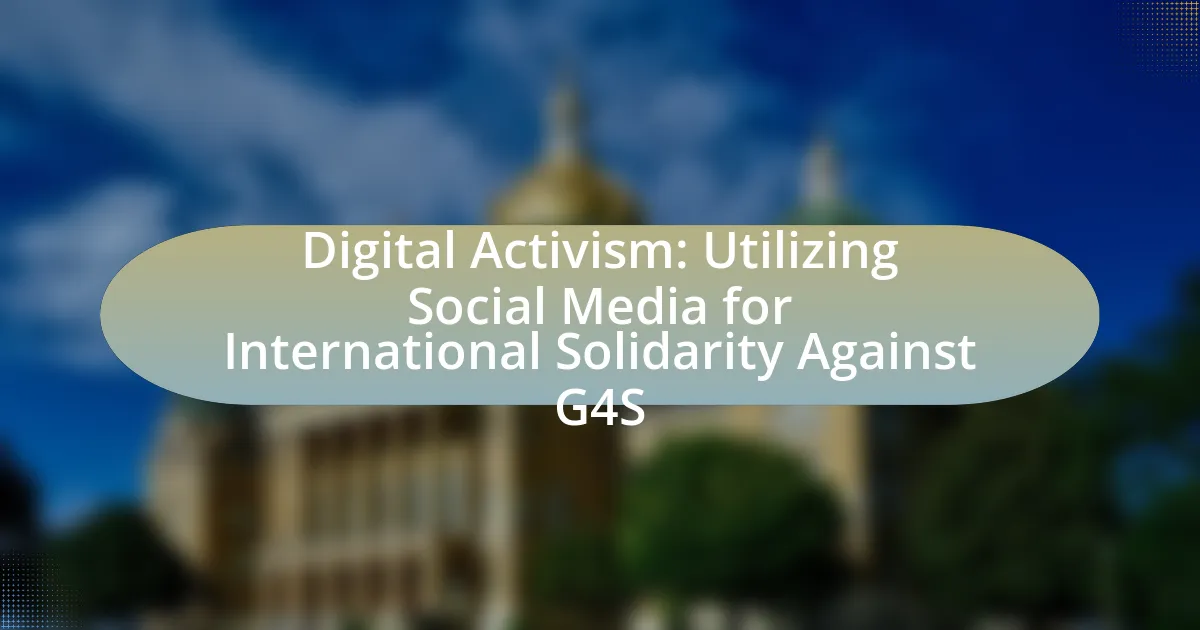G4S, one of the largest security firms globally, has been implicated in numerous human rights violations, including excessive use of force, mistreatment of detainees, and complicity in abuses in conflict zones. The article examines G4S’s operations in relation to human rights, highlighting its Human Rights Policy and the criticisms it faces from organizations like Amnesty International and Human Rights Watch. Key issues discussed include the impact of G4S’s profit-driven business model on human rights practices, the consequences of its actions on vulnerable populations, and the need for accountability and reform. The article also explores the role of international organizations, NGOs, and the public in advocating for human rights and suggests best practices for improving compliance in the private security sector.
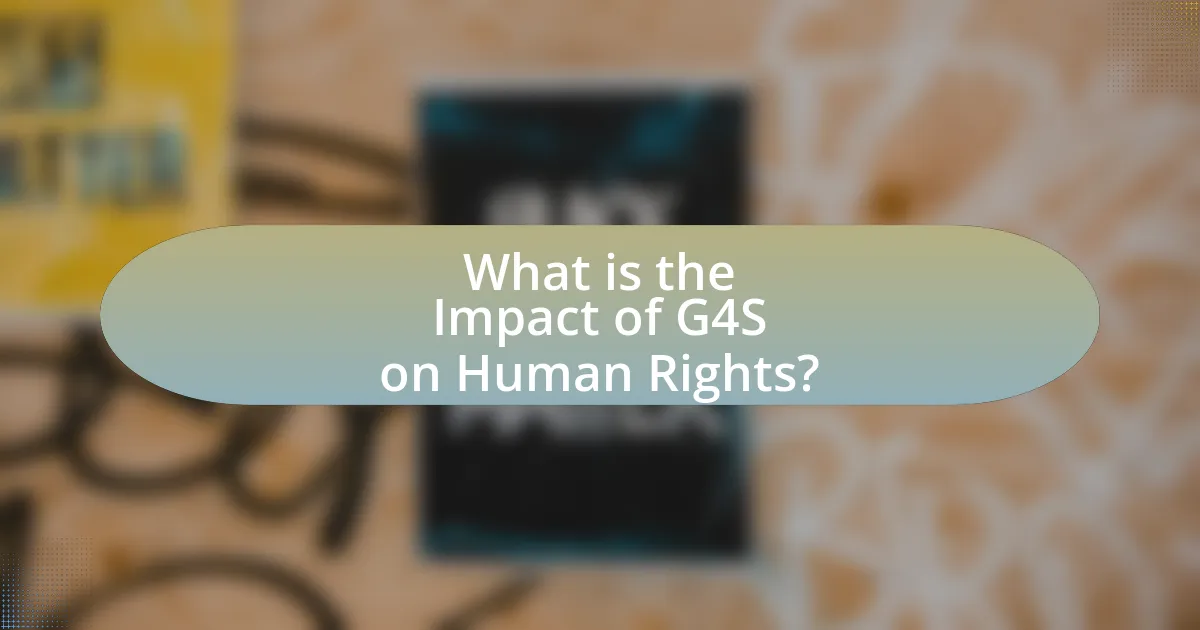
What is the Impact of G4S on Human Rights?
G4S has a significant impact on human rights, often criticized for its involvement in various human rights violations globally. The company has faced allegations related to the mistreatment of detainees, excessive use of force, and complicity in human rights abuses in conflict zones, such as its operations in Israel and Palestine. Reports from organizations like Amnesty International and Human Rights Watch have documented instances where G4S’s security practices have undermined the rights to life, liberty, and security of individuals. For example, G4S has been linked to the management of detention facilities where torture and inhumane treatment have occurred, highlighting the company’s role in perpetuating systemic human rights violations.
How does G4S operate in relation to human rights?
G4S operates in relation to human rights by implementing policies aimed at respecting and promoting human rights standards within its operations. The company has established a Human Rights Policy that aligns with international frameworks, such as the United Nations Guiding Principles on Business and Human Rights, which emphasizes the responsibility of businesses to avoid infringing on human rights and to address adverse impacts. G4S has also committed to conducting human rights due diligence processes to identify, prevent, and mitigate potential human rights risks associated with its services, particularly in high-risk environments. This commitment is evidenced by G4S’s participation in various human rights initiatives and reporting frameworks, which aim to enhance transparency and accountability in its operations.
What are the key human rights issues associated with G4S?
Key human rights issues associated with G4S include allegations of excessive use of force, inadequate treatment of detainees, and complicity in human rights abuses in conflict zones. Reports have documented instances where G4S personnel engaged in violent actions against individuals in their custody, raising concerns about the company’s adherence to international human rights standards. Additionally, G4S has faced criticism for its role in operating detention facilities where conditions have been deemed inhumane, violating the rights of detainees. Furthermore, the company’s involvement in security operations in regions like Israel and Palestine has led to accusations of facilitating human rights violations against civilians, highlighting the need for accountability and reform in their practices.
How does G4S’s business model influence human rights practices?
G4S’s business model, which focuses on providing security services globally, significantly influences human rights practices by prioritizing profit over ethical considerations. This profit-driven approach can lead to inadequate training and oversight of personnel, resulting in human rights violations such as excessive use of force and mistreatment of detainees. For instance, reports have documented instances where G4S personnel were involved in abuses in various contexts, including immigration detention centers, highlighting the consequences of a business model that emphasizes cost-cutting and efficiency over human rights compliance.
Why is G4S’s impact on human rights significant?
G4S’s impact on human rights is significant due to its extensive involvement in security services across various sectors, including prisons, immigration detention, and conflict zones. This involvement raises concerns about human rights violations, such as the treatment of detainees and the use of force. Reports from organizations like Amnesty International and Human Rights Watch have documented instances where G4S has been implicated in abuses, highlighting the company’s role in perpetuating systemic issues related to human rights. The scale of G4S’s operations, which spans over 90 countries and employs hundreds of thousands of people, amplifies its influence on human rights practices globally, making its accountability crucial for promoting human rights standards.
What are the global implications of G4S’s operations?
G4S’s operations have significant global implications, particularly concerning human rights and security practices. The company, as one of the largest security firms worldwide, has been involved in various controversies, including allegations of human rights abuses in conflict zones and detention facilities. For instance, G4S has faced criticism for its role in the management of private prisons and immigration detention centers, where reports indicate instances of mistreatment and inadequate conditions for detainees. These operations can influence international human rights standards and policies, as countries may adopt or reject similar practices based on G4S’s actions. Furthermore, G4S’s global presence can affect local economies and security dynamics, often leading to debates about privatization of security and its ethical implications.
How do G4S’s actions affect vulnerable populations?
G4S’s actions negatively impact vulnerable populations by contributing to human rights violations and exacerbating social inequalities. The company’s involvement in security services often leads to aggressive policing tactics, which disproportionately affect marginalized communities, including immigrants and low-income individuals. For instance, reports indicate that G4S has been implicated in the mistreatment of detainees in immigration facilities, where inadequate conditions and excessive force have been documented. Such practices not only undermine the dignity of these populations but also perpetuate cycles of trauma and marginalization, as highlighted in various human rights assessments.
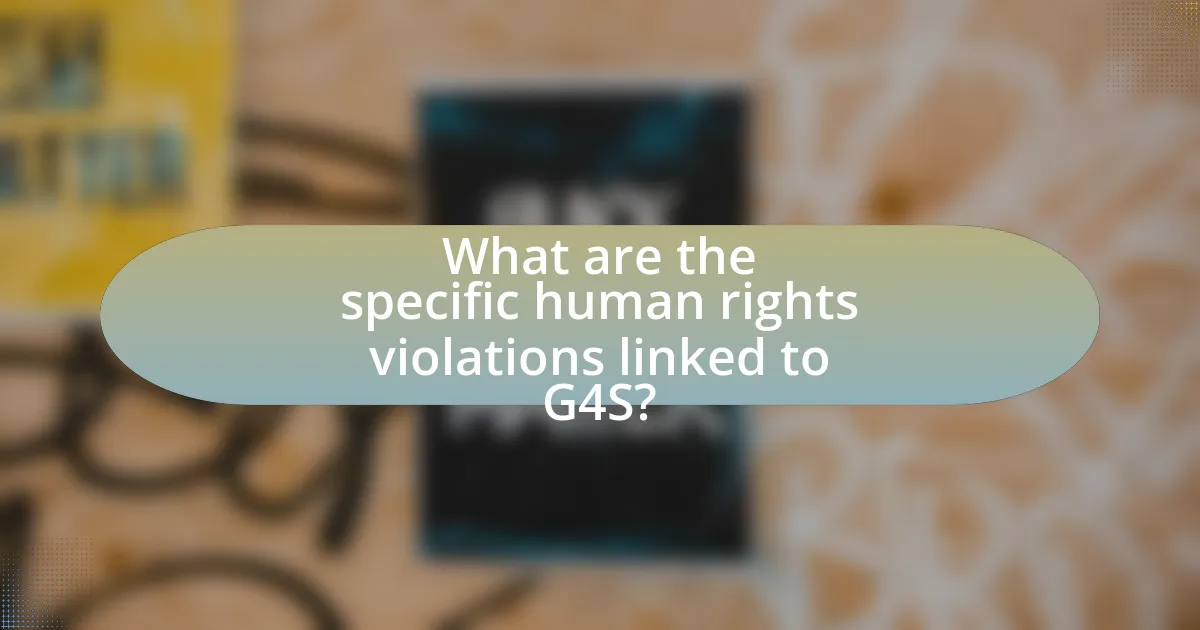
What are the specific human rights violations linked to G4S?
G4S has been linked to several specific human rights violations, including excessive use of force, unlawful detention, and inadequate conditions in detention facilities. Reports from organizations such as Amnesty International and Human Rights Watch have documented instances where G4S personnel employed excessive force during the management of detainees, leading to injuries and fatalities. Additionally, G4S has faced criticism for its role in operating detention centers that have been found to provide substandard living conditions, violating the rights of individuals held within them. These violations highlight the company’s involvement in practices that contravene international human rights standards.
What types of human rights abuses have been reported?
Reported human rights abuses include excessive use of force, unlawful detention, and inadequate living conditions in facilities managed by G4S. Specific incidents have highlighted cases of physical violence against detainees, often resulting in injuries or fatalities, as documented in various human rights reports. Additionally, allegations of torture and inhumane treatment have emerged, particularly in contexts where G4S operates detention centers or security services. These abuses have been corroborated by investigations from organizations such as Amnesty International and Human Rights Watch, which provide detailed accounts of the violations and their impact on individuals’ rights and dignity.
How have these abuses been documented and reported?
Abuses related to G4S have been documented and reported through various human rights organizations, media investigations, and governmental inquiries. Reports from organizations such as Amnesty International and Human Rights Watch have detailed incidents of mistreatment and violations, providing specific case studies and testimonies from affected individuals. Additionally, investigative journalism has uncovered patterns of abuse, often supported by video evidence and firsthand accounts, which have been published in reputable news outlets. These documented abuses have led to calls for accountability and reform, emphasizing the need for oversight in G4S operations globally.
What are the consequences of these violations for affected individuals?
The consequences of violations by G4S for affected individuals include physical harm, psychological trauma, and loss of dignity. These violations often result in severe physical injuries due to excessive use of force, as documented in various reports highlighting incidents of brutality. Additionally, individuals may experience long-term psychological effects, such as anxiety and depression, stemming from their traumatic experiences. Furthermore, the loss of dignity occurs when individuals are subjected to inhumane treatment, which undermines their basic human rights and can lead to social stigmatization. These impacts are supported by findings from human rights organizations that have documented cases of abuse and their effects on victims.
How does G4S respond to allegations of human rights violations?
G4S responds to allegations of human rights violations by stating that it takes such claims seriously and conducts thorough investigations into any reported incidents. The company emphasizes its commitment to human rights and adheres to international standards, including the UN Guiding Principles on Business and Human Rights. G4S has publicly stated that it aims to ensure that its operations do not contribute to human rights abuses and has implemented policies and training programs to promote ethical conduct among its employees.
What measures does G4S claim to implement to address these issues?
G4S claims to implement several measures to address human rights issues, including the establishment of a Human Rights Policy that aligns with international standards. This policy is designed to guide the company’s operations and ensure respect for human rights across its services. Additionally, G4S states that it conducts regular human rights impact assessments to identify and mitigate risks associated with its activities. The company also emphasizes training programs for employees to raise awareness about human rights and promote ethical practices within its workforce. These measures are part of G4S’s commitment to improving its operational impact on human rights globally.
How effective are G4S’s responses in mitigating human rights concerns?
G4S’s responses in mitigating human rights concerns have been largely criticized as ineffective. Reports from organizations such as Amnesty International and Human Rights Watch highlight ongoing issues related to the treatment of detainees and the use of force by G4S personnel. For instance, a 2019 report by Amnesty International documented instances of excessive use of force in facilities managed by G4S, indicating a failure to implement adequate training and oversight. Additionally, G4S has faced legal challenges and public scrutiny over its role in controversial practices, such as immigration detention, which further underscores the inadequacy of its responses to human rights issues.
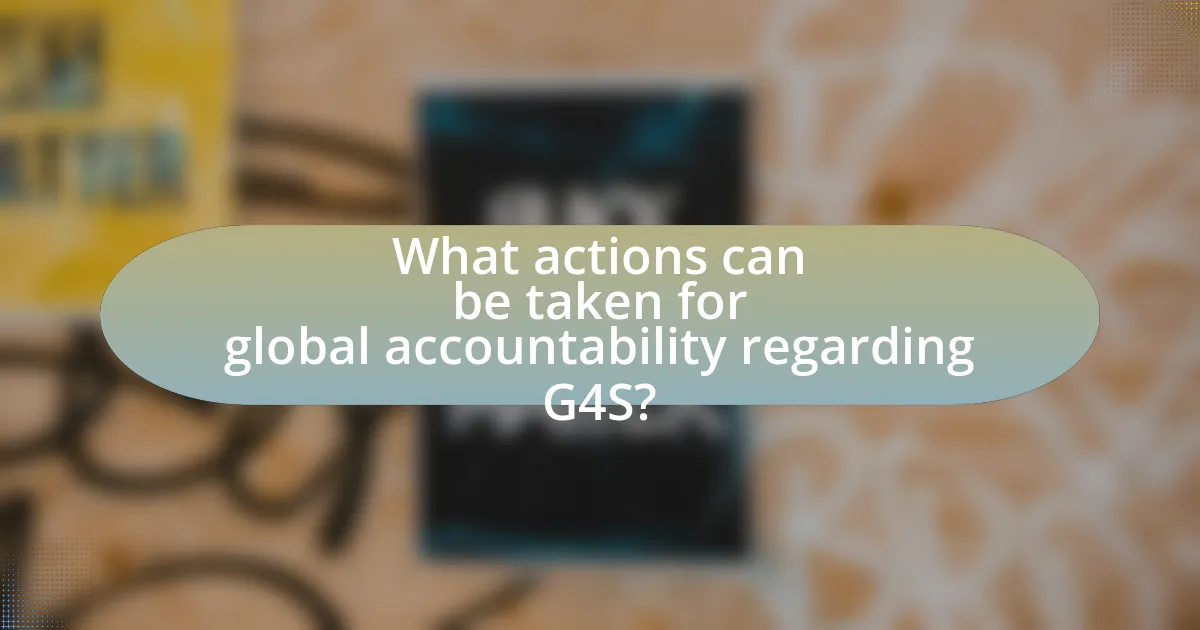
What actions can be taken for global accountability regarding G4S?
To ensure global accountability regarding G4S, stakeholders can implement comprehensive monitoring and reporting mechanisms. These mechanisms should include independent audits of G4S operations, particularly in regions with documented human rights violations, to assess compliance with international human rights standards. For instance, the UN Guiding Principles on Business and Human Rights provide a framework for companies to respect human rights, which G4S should adhere to. Additionally, civil society organizations can advocate for transparency by publishing reports on G4S’s practices and engaging in public campaigns to raise awareness about its impact on human rights. Furthermore, governments can impose stricter regulations and penalties for companies that fail to uphold human rights, thereby holding G4S accountable for its actions globally.
How can international organizations influence G4S’s practices?
International organizations can influence G4S’s practices through advocacy, regulatory pressure, and monitoring compliance with human rights standards. For instance, organizations like the United Nations and Amnesty International can leverage their platforms to highlight human rights violations associated with G4S, thereby pressuring the company to adopt more ethical practices. Additionally, international treaties and guidelines, such as the UN Guiding Principles on Business and Human Rights, provide frameworks that can hold G4S accountable for its operations. Reports and findings from these organizations can lead to public scrutiny and affect G4S’s reputation, compelling the company to implement changes to align with global human rights expectations.
What role do NGOs play in advocating for human rights in relation to G4S?
NGOs play a critical role in advocating for human rights in relation to G4S by monitoring the company’s practices, raising awareness of human rights violations, and holding the organization accountable for its actions. For instance, organizations like Amnesty International and Human Rights Watch have documented instances where G4S has been implicated in human rights abuses, such as the mistreatment of detainees in facilities it manages. These NGOs utilize reports, campaigns, and public pressure to influence policy changes and promote ethical standards within G4S, thereby contributing to a broader movement for human rights protection globally.
How can consumers and the public hold G4S accountable?
Consumers and the public can hold G4S accountable by actively engaging in advocacy, utilizing social media platforms to raise awareness, and supporting campaigns that demand transparency and ethical practices. For instance, organizations like Amnesty International have documented human rights violations linked to G4S, providing a basis for public scrutiny. Additionally, consumers can choose to boycott G4S services and products, thereby exerting economic pressure on the company. Public petitions and participation in protests can further amplify demands for accountability, as seen in various campaigns against companies involved in human rights abuses. By leveraging collective action and informed consumer choices, the public can significantly influence G4S’s operational practices and commitment to human rights.
What best practices can be adopted to promote human rights in security services?
To promote human rights in security services, organizations should implement comprehensive training programs focused on human rights principles. These training programs must educate security personnel on the importance of respecting individual rights, legal standards, and ethical conduct. Evidence from the United Nations suggests that training in human rights can significantly reduce instances of abuse and misconduct within security forces. Additionally, establishing clear accountability mechanisms, such as independent oversight bodies, ensures that violations are reported and addressed effectively. Research indicates that transparency and accountability in security operations lead to increased public trust and compliance with human rights standards. Furthermore, engaging with local communities to understand their concerns and perspectives fosters a collaborative approach to security that prioritizes human rights.
What frameworks exist for ensuring human rights compliance in private security?
The frameworks that exist for ensuring human rights compliance in private security include the United Nations Guiding Principles on Business and Human Rights (UNGPs), the International Code of Conduct for Private Security Service Providers (ICoC), and the Voluntary Principles on Security and Human Rights (VPSHR). The UNGPs provide a global standard for preventing and addressing the risk of adverse human rights impacts linked to business activity, emphasizing the responsibility of companies to respect human rights. The ICoC establishes principles for private security companies to operate in a manner that respects human rights and fundamental freedoms, while the VPSHR offers guidance for companies on how to maintain human rights standards in their security operations. These frameworks are supported by various organizations and initiatives that monitor compliance and promote accountability in the private security sector.
How can companies like G4S improve their human rights records?
Companies like G4S can improve their human rights records by implementing comprehensive training programs focused on human rights standards for all employees. Such training ensures that staff understand their responsibilities and the implications of their actions on human rights. Additionally, G4S can establish transparent reporting mechanisms that allow for the documentation and investigation of human rights abuses, fostering accountability. According to the UN Guiding Principles on Business and Human Rights, companies are expected to respect human rights and provide remedies for any violations. By adhering to these principles and engaging with stakeholders, including affected communities, G4S can enhance its commitment to human rights and mitigate risks associated with its operations.
What steps can individuals take to support human rights advocacy against G4S?
Individuals can support human rights advocacy against G4S by raising awareness through social media campaigns and community events. Engaging in discussions about G4S’s human rights record, including documented abuses such as the treatment of detainees and involvement in controversial security operations, can mobilize public opinion. Additionally, individuals can participate in or organize protests and petitions that demand accountability from G4S, leveraging the power of collective action. Supporting organizations that monitor and report on G4S’s practices, such as Amnesty International or Human Rights Watch, can also amplify advocacy efforts. These actions are validated by numerous reports highlighting G4S’s involvement in human rights violations, which underscores the importance of public engagement in driving change.
